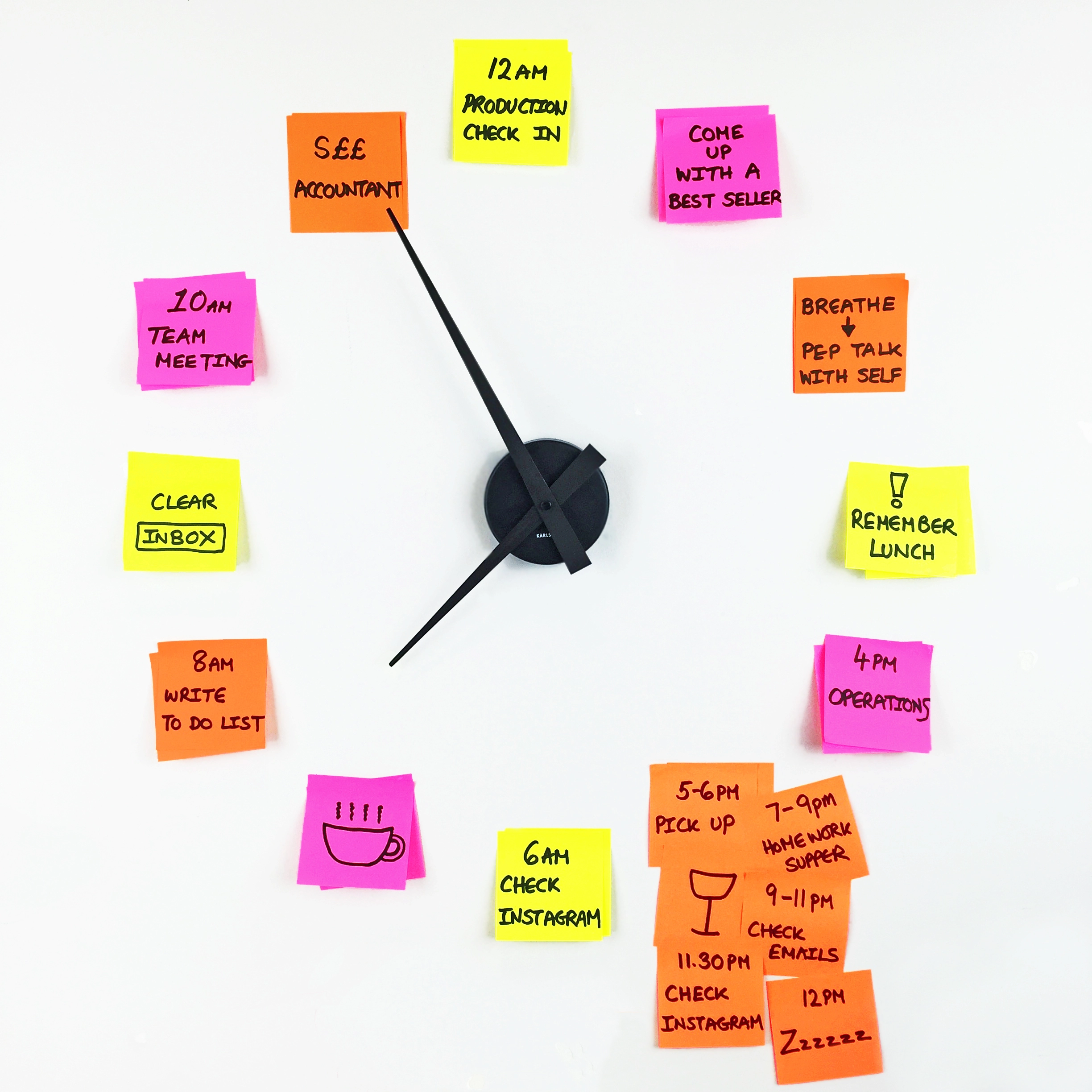NEXT DROP 6TH MARCH 7AM. JOIN CLUB HOLL & CO FOR ACCESS

Effective time management strategies: how to work faster and smarter
business wisdom
With Kate Downey-Evans, expert business psychologist
3RD SEPTEMBER 2023
What are the best strategies of time management? From creating daily tasks or blocking out distractions to prioritisation and delegation, Kate Downey-Evans shares some expert tips and time management techniques to improve your efficiency.

How can I work faster and smarter? How can I manage my time more effectively?
Kate Downey-Evans, our resident expert business psychologist and coach, is here to help us get smart about how we use our time and the choices we make. In this article we’re going to look at the boundaries we need to put in place to protect those things that we don’t want to lose from our everyday lives (or watch our founder Holly Tucker’s IGTV on this topic). We’re also going to look at our habits and shake them up. Kate tells us, “Some of this may be really obvious, but when we’re overwhelmed it can be hard to see the wood for the trees. I’m a founder of a small business myself and I’m constantly having this conversation in my own head, I know it’s not easy.”
Effective time management: start by creating boundaries
Let’s begin by looking at our week and how we plan it so that it’s not just about work and productivity. Say you want to get back into doing exercise but you’re already overloaded — where’s the time? Or you want to get more sleep? The obvious answer is, ‘Go to bed earlier.’ But what if you’re working late and then can’t settle down? This is about thinking through how you use your time and where your boundaries need to be to make it work. It’s only by setting boundaries that you’ll be able to protect what’s important to you. Let’s look at how to do this…
How to improve time management skills: introducing ‘Zones of Flexibility’
There are many forms of a working week, but generally in a day there are at least three Zones of Flexibility: the start of the day, middle of the day and end of the day.
Think about the start of the day, what’s the earliest time you can reasonably start and the latest time you could start? For many people that zone is actually wider than the evening which we sometimes think of as ‘our time’. But the evening zone is subject to being squashed — by taking care of the family, tiredness or just winding down. The morning zone tends to stay open.
It’s the same with lunchtime — so what can you do? Can you take time to enjoy the process of making a delicious lunch, reading our self care tips for small businesses? Or do you play a musical instrument that you never make time for? Can you get back to doing what you really love like doing some freestyle drawing or painting, purely to explore and unwind? Remember what your ‘thing’ is. There’s so much research out there that shows that creative hobbies equal better business performance; they’re a source of energy.
Some of this may be really obvious, but when we’re overwhelmed it can be hard to see the wood for the trees. I’m a founder of a small business myself and I’m constantly having this conversation in my own head, I know it’s not easy.
What are the main time management techniques? Try time blocking
Sketch out your week so you can start to see some Zones of Flexibility you could use. It’s not about changing your hours, it’s just planning your time differently — each week can and will be different, but empower yourself to design your own unique week and make it work for you. Be creative with this, maybe using a planner to block out time in different colours so that you have something visual to remind you.
“What you’re looking for is a blend,” Kate explains, “Not half-work, half-life. I don’t really like the term work-life balance, I prefer harmony, so if you think of your life as an orchestra — you’re looking for this lovely blend of sounds rather than this massively loud trumpet that drowns out everything you love. You also don’t want to cram everything outside of work into your weekends, so re-structuring your week to build some energising activities in, is the ideal way to create more harmony.”
Habits vs choices: how to tell the difference between them
If we manage our life by our to-do list, we’re never going to win because we can always see that there’s more we could be doing. So we need to put boundaries in place; but what eats these boundaries for breakfast is our habits. If you start using a few hours to work on a Sunday or you work through lunch a few times, it can easily become a habit and become every Sunday or lunchtime. Have a think about what you regularly let slide into your protected time.
Holly & Co’s founder Holly Tucker is no stranger to this and her view is this, “It’s all about calling it out. It’s about saying, ‘I am going to be working late tonight, Family,’ and then trying not to have them saying, ‘Well, Mummy’s always working late.’ What I do is I highlight things on my to-do list that are life-or-death and other things that are then just ‘to-do’ (and can carry over into the next day).”

I don’t really like the term work-life balance, I prefer harmony, so if you think of your life as an orchestra — you’re looking for this lovely blend of sounds rather than this massively loud trumpet that drowns out everything you love.

Ruthless prioritisation; how to do this well
Kate agrees with Holly's approach, “This is ruthless prioritisation. Can you draw a line between what really matters today and everything else that you could do? When you’re feeling overwhelmed you need to tighten that line so that you start your day with absolute clarity on the two or three things you absolutely must do. Everything else is then a bonus. It also comes down to how you plan. If you use a to-do list, it tends to be a vertical stack of demands which can be overwhelming. A plan spreads things out horizontally offering an overview of today, tomorrow, next week, next month. This gives you more flexibility and a sense of control.”
Positive habits to get into to manage your time
Are you blocking out time to get things done rather than hoping for the best? Our days are full of interruptions — on average, we do 11 minutes of work before being interrupted. So get ruthless:
- Can you question the importance of some of these interruptions?
- Do you need to respond to every email as it comes in?
- Do you need to say yes to all these meetings?
- Can a meeting scheduled for an hour actually be 20 minutes?
The art of delegation: the benefits of relinquishing control to others
The main reason we don’t delegate is because we like to be in control. Other times it just feels easier to do it yourself or it can also be a great distraction from the more laborious work you really should be doing. None of these things are helping grow your business in the long-term and it can tip you into a sense of overwhelm, so start calling in your team or ask friends and family to help out. The more you practise delegation, the better at it you’ll become and the more you’ll empower those around you. This is core business advice.
Can you draw a line between what really matters today and everything else that you could do? When you’re feeling overwhelmed you need to tighten that line so that you start your day with absolute clarity on the two or three things you absolutely must do. Everything else is then a bonus.
Effective time management strategies: key takeaways…
Start planning your week in a way that suits your needs and practise some good time management habits. Before you know it, you’ll find your groove, which will not only energise you, but helps build that resilience you need when time is tight. Remember…
1. What small changes can you make?
If you don’t have a team, who in your life can you delegate to just to ease the load a little bit? Recruit your family, ask other people. Remember, your friends want to support you.
2. Design your week — what are your preferred Zones of Flexibility?
Can you fit some late starts or some early finishes into your day? Create the perfect funny-shaped week for you that includes socialising, relaxation, exercise and family time.
3. What are your bad habits and how can you shake them up?
Do you try to cram in a few hours on the laptop later in the evening? Be honest and think about where you need to break bad habits by creating a boundary and drawing a line.

Images: 'Do More Of What Makes You Happy' embroidery hoop — by Make & Mend, 'Flexibility Is The Key To Success' key — commissioned by Holly & Co, '
Related content
MORE ARTICLES ON BUSINESS WISDOM

6 things to consider when hiring friends and family
Business wisdom

Relocating your business to your dream location
Business wisdom

How to have difficult conversations
Business wisdom

6 things to try when sales are low
Business wisdom

Scaling your business while preserving the magic
Business wisdom

Top 5 expert tips for getting the most out of your mentorship
Business wisdom

7 ways to jumpstart sales in a tough economic environment
Business Wisdom
Be the first to know
Sign up to our emails for brand new small business magic and inspiration. And if you create an account, you’ll also get exclusive product drops, discounts and more from Club Holly & Co, too.
